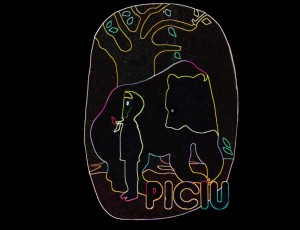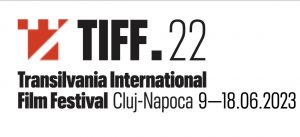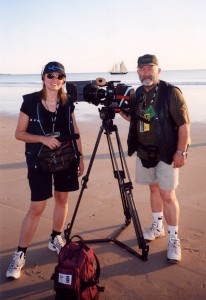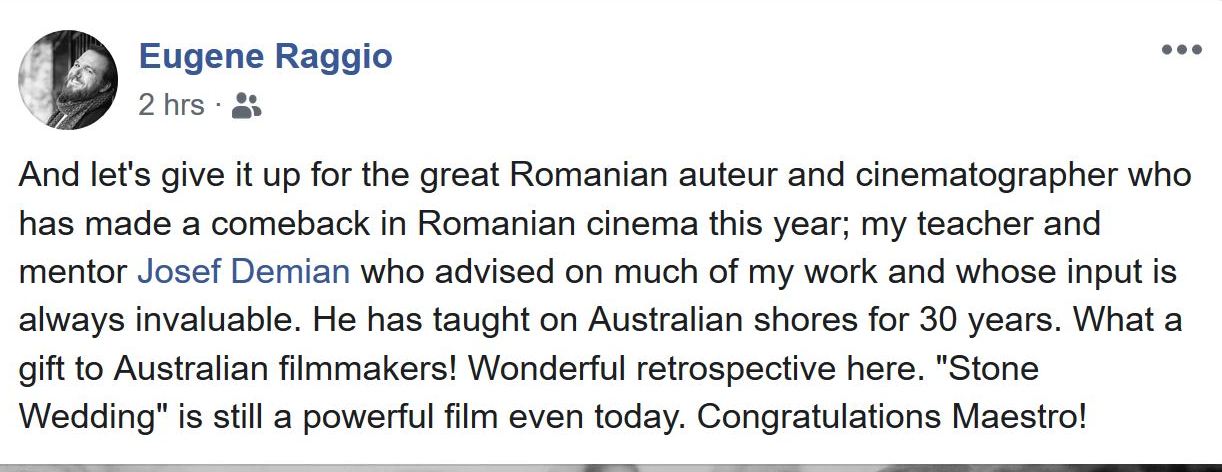
Josef Demian’s last movie shot before he left Romania in 1984 can be seen at TIFF 2023.


Josef Demian’s last movie shot before he left Romania in 1984 can be seen at TIFF 2023.


Erika and Josef both had built highly successful individual carriers before they met and became husband and wife, and at the same time, a creative power couple.
Erika Józsa is a journalist, information professional, author, singer-songwriter & composer. She was best known as the presenter of the Hungarian program on Romanian Television, one of the most popular and much-loved TV personalities of the 70s and 80s.
She debuted as a singer songwriter still in her teens, formed her first band at 17, then a duet with Károly Horváth in 1970. They are referred to as the voice of a generation, pioneers of a musical movement born in Transylvania in the early 1970s. They became the best known and most loved folk singers, touring extensively throughout Romania and Hungary. Their records are in circulation even today. The LP Kettőspont ( which gave the name of this website) originally published in 1978, was relaunched in 2003 by Moiras Records, Budapest both in vinyl and CD format.
Erika composed the music for a series of television films and movies (co-author Károly Horváth). The most important were the feature films Baloane de curcubeu “Rainbow Bubbles” (1981), Lovind o pasare de prada “Killing a bird of Prey” (1982) and “Piciu” (1984),all directed by Josef Demian.
This is how the professional partnership of Erika and Josef started.
***
Josef Demian is a well-respected, multi-award winning cinematographer, director & script writer with a long list of feature films and documentaries to his name. He is also an educator, teaching and mentoring generations of film makers towards successful careers. His masterclasses are in high demand, and his unique method of teaching is extremely popular with students.
Josef (Iosif) Demian is a reference name in the international cinema, one of the main authors of the film Apa ca un bivol negru (Black Buffalo Water), a production that marked the beginning of the 70s Romanian New Wave Cinema. He signed the cinematography of a number of benchmark films (Nunta de piatră/The Stone Wedding, Duhul aurului/The Spirit of Gold, Zidul/The Wall, etc.).
Moving from cinematography to directing, he excelled once more. The first film he independently directed, O lacrimă de fată (A Girl’s Tears, 1980), was in the official selection of the International Cannes Film Festival (Un Certain Regard, 1982). He continued, directing a number of highly successful films (Baloane de curcubeu/Rainbow Bubbles, Lovind o pasăre de pradă/To Kill a Bird of Prey, Piciu/The Kid).
His films irritated the communist censorship of that time, the repercussions causing him to leave the country.
Erika, Josef and their son moved to Australia in 1986.
Erika continued her carrier in music as a solo artist. Besides performing throughout Australia, she never abandoned her faithful fans back in her homeland, returned frequently to perform, most recently in 2018, celebrating the 50th anniversary of her debut in music. She also continued her career as multilingual journalist, foreign correspondent for European TV stations and as multimedia and television producer in partnership with husband Josef . She also continued to play and write music and authored several books.
Josef had a successful academic carrier, which started as Head of Cinematography at the Australian Film Television and Radio School, and continued at several other film schools. He never stopped making films, mostly documentaries, but also an Australian feature film, City Loop as DOP.
Together they established their own production company JED Productions and went on producing a series of documentaries in Australia, New Zealand as well as South America. They created their own brand of film, where the two of them fulfilled every major role usually listed on the end credit list. Erika covered research, script, interviewing, commentary, production management, music. Josef directed, shot and edited their films.
Josef has been invited back to Romania and Hungary frequently for masterclasses in directing and cinematography, or as member of festival juries. In 2010 he wrote and directed in Romania – the film-essay Memoria de piatră (Stone Memory). The music was composed by Erika.
Their most recent collaboration is the feature film Night Patrol, a Romanian -Hungarian coproduction due to be released in 2020, delayed by the pandemic.
Josef Demian’s films are being discovered and appreciated by successive new generations. Rainbow Bubbles was reborn after thirty-five years, launched on Blue Ray. Maiden Tear was declared “an avant-garde film”, and both have become cult-movies, and are still screened in cinemas.
****
CONTACT email: jd.erika@yahoo.com.au
****
KETTŐSPONT (Colon)
is the title of Erika’s most successful album relaunched in 2003 with the publisher’s recommendation cited below.
Erika Józsa and Károly Horváth are the voice of a generation, pioneers of a musical movement born in Transylvania in the early 1970s. They have become the best known and most loved folk singers, touring extensively throughout Romania and Hungary.
Erika and Károly formed their duet in 1970. They called it CONCORDE.
Erika brought with her the earlier experience of leader, guitarist, lyricist and composer of a beat band, Károly his classical cello training, his love for medieval music and archaic folk songs.
From the fusion of these two completely different musical worlds a new, original, unmistakable and refreshing style emerged which holds its place even today amongst the wide variety of styles in contemporary Hungarian popular music.
Their music is a very successful blend of Beat, Hungarian folk music and classical music. They dare to experiment, mixing elements of different genres, using classical instruments like the violin, cello, double base and guitar together with archaic Hungarian folk instruments like the citera, or the gardon, a unique instrument of the Csángós.
Another strength — and also a first — was the extremely high standard of their lyrics. Erika was the most highly acclaimed lyricist of the time.
Kettőspont means Colon. This little-appreciated punctuation mark inspired the album’s closing song, also giving it its title.
Erika’s main carrier path developed in television. For over a decade and a half she was the very popular presenter and reporter of the Hungarian program on Romanian Television. In 1985 she left her native country and now lives in Australia.
LINK TO THE LATEST ARTICLE:
Cselló, citera, gardon, és remek szövegek – egy folk-duó Erdélyből
Chelo, zitera, gardon and outstanding lyrics – a folk duo from Transylvania
Concorde
